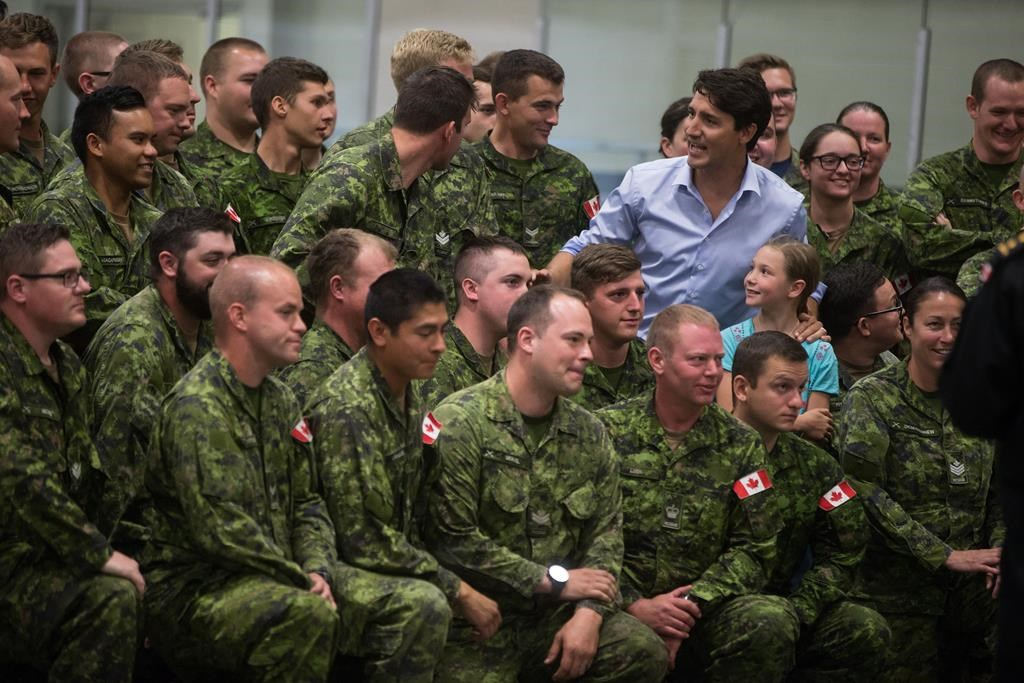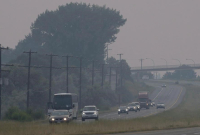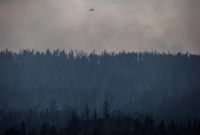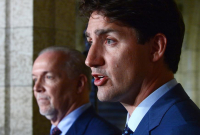Prime Minister Justin Trudeau says a helicopter tour of British Columbia's charred landscape Monday left him awed by the destructive force of wildfires burning across the province and impressed by the extraordinary determination of firefighters battling the flames.
Trudeau said he saw ranches in the Cariboo region surrounded by scorched earth and evidence of flames stopping just short of a runway.
"The speed at which it can flare up, the way it could cut across roads, really impressed upon me the extraordinary work being done by our wildfire professionals," he said. "I really saw the extent of the scale of the devastation and the damage."
Fire crews on the edge of exhaustion have pushed through to keep people and buildings safe, the prime minister added.
Trudeau, accompanied by several federal politicians and B.C. Premier John Horgan, spent an hour above a fire zone in a Canadian Forces' Chinook helicopter watching spot fires and billowing smoke. At times, the dense smoke blurred out the land below.
Wildfires burning in the Cariboo have forced thousands from their homes, including 10,000 residents of Williams Lake who had to leave on July 15 when a fast-moving fire encroached on their community.
People were allowed to return last weekend, but the city remains under evacuation alert and residents must be ready to leave again at a moment's notice.
Most businesses in Williams Lake had re-opened Monday, but it was a staggered start as many employees were still returning to the community. The local Boston Pizza restaurant was open Sunday evening, but ran out of pizza.
About 6,000 people remained displaced by the nearly 150 fires that were still burning across B.C. on Monday.
Dozens of homes have been lost as more than 800 fires have burned around the province, scorching about 4,200 square kilometres.
Trudeau said he recognizes how difficult the aggressive fire season has been for residents, businesses and local economies. He pledged that Ottawa will help with recovery efforts.
"There will be challenges in the months to come that we will also be there for," he said. "This is what Canadians do, we stand up for each other in times of difficulty," he said.
People in the Cariboo have been hit especially hard by wildfires this year, Horgan said, echoing Trudeau's promise.
"We're going to make sure people are whole when this is all over," Horgan said. "The province is going to be there to help rebuild."
Trudeau thanked those on the front lines of firefighting efforts for "stepping up," saying it is reassuring for people to see everybody pulling together.
Several hundred Williams Lake residents cheered as Trudeau and Horgan emerged from a recreation centre where they met first responders. The cheering grew louder as fire service personnel left the building.
The prime minister also sat down for lunch and a chat with some BC Wildfire Service personnel, many wearing the red coveralls of the firefighters.
"What do you do in the winter?" Trudeau was heard asking some of the crew.
He and Horgan then took a tour of the fire operations centre at the Williams Lake Airport.
Kevin Skrepnek, chief fire information officer with the BC Wildfire Service, said the visit means "a great deal" to fire crews who have been affected both personally and professionally by the aggressive fire season.
Many staff were among those evacuated from Williams Lake and had to sleep in tents or in their offices while responding to fires around the community, he said.
"I would say it's a morale booster in terms of having those kinds of visits," Skrepnek said.
The political visit comes as the forecast calls for another week of hot, dry weather.
Environment Canada has issued a special warning about a heat wave for Metro Vancouver, the Fraser Valley, Howe Sound and several parts of Vancouver Island.
Residents have been told to expect daytime temperatures to soar to the upper 30s.
Lightning forecast for the Interior, where many fires are already burning, could make the fire situation even worse.
Smoke from fires in both B.C. and Washington state could also pose a problem for crews, reducing visibility for aircraft detecting and fighting the flames and making it unsafe for them to fly, Skrepnek said.
He said winds were forecast to push the haze west to the coast by Tuesday.
"I think across many parts of the province we're likely going to have this smoke settling in for quite some time," Skrepnek said.
An air quality advisory has also been issued for Metro Vancouver and the Fraser Valley as smoke from B.C.'s Interior wafts into the region.





Comments